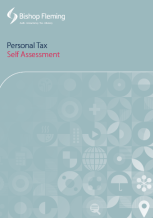Basis Period Reform - do I need to act now?
The way that the profits of sole traders and partnerships are assessed to tax is changing for those using an accounting date that does not coincide with the tax year.
Ashleigh Ingram, Tax Executive, Bishop Fleming, explains.
This basis period reform can result in more tax being due, but the good news is that any additional liability can be spread over a number of years.
What is the Basis Period Reform?
Basis Period Reform is a change that has been introduced this year under the Self-Assessment Income Tax system.
Since 1996/97, unincorporated businesses have been required to complete their accounts and tax returns using what is referred to as the Current Year Basis of assessment.
This means that profits are assessed for tax purposes depending on the tax year in which the accounting period ends.
For example, a business with a 31 December 2022 year end would have its profits for that accounting period assessed within the 2022/23 tax return.
However, the new Basis Period Reform means that this is no longer the case, as individuals and businesses will now need to file their tax returns based on the actual income and profits made in that tax year, i.e., the Tax Year Basis of Assessment.
When does it take effect?
The reform takes full effect from the 2024/25 tax year, which begins in just over 9 months’ time (at the time of writing).
However, the current 2023/24 tax year is treated as a Transitional Year, to bring individuals and businesses in line with the new assessment method.
Who does it affect?
The reform affects all unincorporated businesses that currently draw up accounts to any date other than 31 March to 5 April (an end date of 31 March – 4 April is regarded as the same as the tax year end by concession).
So, if you already have your accounts drawn up to 31 March or 5 April, then the reform does not apply.
But if this is not the case, you need to read on.
How does it work / what are the issues?
2023/24 Tax Year – Tax Returns due 31 January 2025
As noted above, the 2023/24 tax year is deemed to be a transitional year, which allows businesses to switch across from the current year to the tax year basis.
The transition will be achieved by assessing the following profits within the 2023/24 tax return:
- The accounting period that would have typically been assessed under the current year basis, plus
- Any additional profits which have not yet been assessed to bring assessed profits up to 31 March / 5 April 2024
For example, if a business has a December year-end, the 2023/24 assessable profits will include:
- the year-ended 31 December 2023, plus
- the profits for the period 1 January – 31 March / 5 April 2024.
This will mean that businesses will have more than 12 months’ worth of profits being assessed during this current tax year.
The most affected businesses will be those with a year end date early in the tax year, such as those with a 30 April year end, meaning up to 23 months’ worth of profits could be assessed in just one tax year.
Relief
To help relieve some of the additional tax that will arise for these businesses, all unused overlap profits brought forward from 1996/97 or later will be deducted from the 2023/24 assessable profits.
(By overlap profits we mean profits that have previously been taxed more than once, which can typically occur in the early years of a business, or when the Current Year Basis of Assessment was introduced.)
If you are likely to be affected by this extra tax charge and are unsure of what your overlap profits are, we can help with this, so please let us know.
In addition to the overlap relief, businesses will also have the option to spread any remaining additional profits (after deducting overlap relief) over five years, to gradually settle the additional tax payable.
It is a choice to spread any extra tax over a five-year period, but businesses can instead choose to settle all the additional tax arising in the 2023/24 tax year if they so wish.
However, it may be more beneficial to spread where, for example, the extended assessable period results in income exceeding £100,000 for the year (causing personal allowances to be tapered).
Please note that the spreading election may not always be available or advisable. We can advise on this.
2024/25 Tax Year – Tax Returns due 31 January 2026
As mentioned above, for the 2024/25 tax year and beyond, businesses will be taxed on their profits arising in the tax year, regardless of the accounting period they use.
Businesses that already operate with an accounting period end date of between 31 March and 5 April will therefore not see any changes because of the reform.
However, all other businesses will be affected.
If a business’s accounting period end date remains at any point other than 31 March – 5 April, they will be required to pro-rate their figures from two accounting periods to calculate profits made across the tax year.
For example, if a business has a year-end of 31 December, the taxable profits for the 2024/25 tax year will comprise of:
- 9 months of profit from the year ended 31 December 2024 (i.e., April – December 2024) and
- 3 months of profit from the year ended 31 December 2025 (i.e., January – March 2025)
This may result in some businesses needing to use provisional figures within their tax returns, as the figures for the later accounting period may not be known until after the tax return filing deadline (e.g., you would only have 31 days from the end of the 2025 accounting period to finalise the figures required within the 2024/25 tax return).
If provisional figures are used, HMRC has agreed that businesses will have until the usual amendment deadline (12 months after the original deadline) to amend the return with finalised figures.
Using our example above, businesses would therefore have until 31 January 2027 to correct the provisional figures included within the 2024/25 tax return.
This cumbersome process of using provisional figures and then amending returns will be required on an annual basis from now on where businesses continue to operate with a non-31 March / 5 April year-end.
Next Steps
All unincorporated businesses with an accounting period that does not coincide with the tax year will need to consider the impact of these changes, including ongoing costs and administrative challenges.
Please do discuss this with us if you would like assistance in understanding the impact of these changes on your business.
It may be best to consider changing your business’s accounting period to match the tax year, but it is not necessarily suitable for all businesses as there can be genuine commercial and logistical issues in having an alternative date.
HMRC resources:
Further information
If you would like to know more about basis period reforms and how they may affect your business, please contact a member of our Business Tax team.







